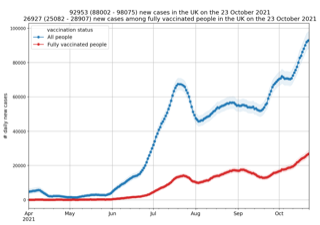BRITS should stay at home if they think they have a cold as winter illnesses make it harder to detect Covid-19, one expert has warned.
Coronavirus infections are still rising across the UK and Brits have been urged to get their booster vaccines in a bid to combat waning immunity in those who had their shots at the start of the rollout.


Professor Tim Spector, of King’s College London and the lead on the ZOE COVID Study app today warned that hospitals are ‘filling up’ with Covid patients and that the public ‘must take matters into our own hands’.
Symptomatic cases of coronavirus have increased by 14 per cent in the last week, data from the ZOE app states.
There are currently around 92,953 new daily, versus 81,823 new daily cases last week.
Prof Spector said that simply, if you don’t feel right, stay at home.
“We now know that masks add a layer of protection, so wearing them on public transport and in crowded places is a good idea. Avoiding unventilated crowded events is another, as well as working more from home.
“Finally, staying at home and getting tested when you feel unwell is key. There’s a lot of cold and flu out there making it harder than ever to tell the difference between a harmless cold or Covid.
“However, there are some symptoms that are very telling of Covid, particularly loss of smell and taste. If you feel ill, always check by taking a quick and easy Lateral Flow Test, even if you think it’s just a cold.”
Last week Trending In The News launched its Give Britain a Booster campaign, in order to encourage people to come forward for their booster jabs to stop infections spreading and taking hold this winter.
Millions of Brits have had two doses of a vaccine, but many remain unvaccinated and others also need their booster top up.
The data also showed that cases in double vaccinated people is still rising, up from 23,199 cases last week to 26,927 this week.
Prof Spector said with no sign of further restrictions being implemented by the government, now is the time to get the booster jab.
He said: “With the UK government delaying any decision while hospitals fill up, it’s time to take matters into our own hands to address the worsening situation.
“Public action has worked in previous waves to reduce rates before lockdowns. Firstly, we need to encourage everyone to get vaccinated. Our rate of 67 percent in total is just not good enough compared to other countries; all those eligible for a booster vaccine should get one now.
“ZOE data has shown vaccine protection is waning and boosters will further cut the number of vaccinated people (who make up almost a third of daily cases) getting infected.”
Earlier today Sir Patrick Vallance who has helped guide ministers over the pandemic, said the UK is facing a “very uncertain time” ahead.
While the Government is resisting calls to implement Plan B now – relying on Plan A of booster jabs – Sir Patrick warned of acting too late.
Plan B would see a return to mandatory mask wearing and working from home orders.
Prof Spector said many cases are being missed and that the government is ‘underestimating the cases’.
“The ZOE data shows the UK could hit 100,000 new cases sooner than expected and with no sign of a Plan B or Plan C.
“The ZOE figures are consistently higher than the official confirmed daily cases because we get results from various sources, including self-reported lateral flow tests that are under-reported officially.
“The government raw figures report on PCR testing of the classical symptoms only, which miss around 40 percent of cases. ZOE extrapolates the data from our sample to predict daily infections in the wider population.
“With the confirmation of our estimates from the ONS’s fortnightly survey, it’s clear the government figures are a big under-estimate, and with the highest rates in Western Europe, there’s no room for complacency”, he added.






